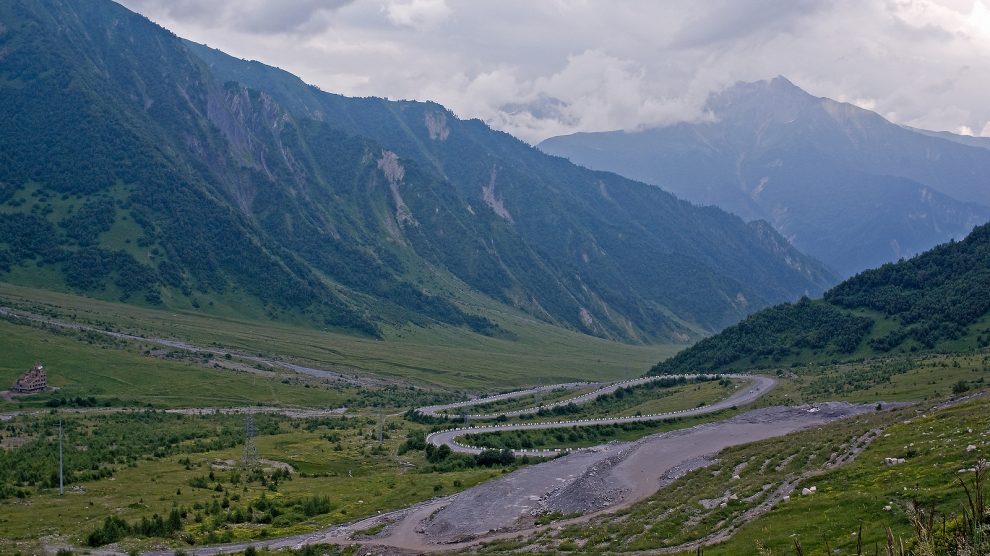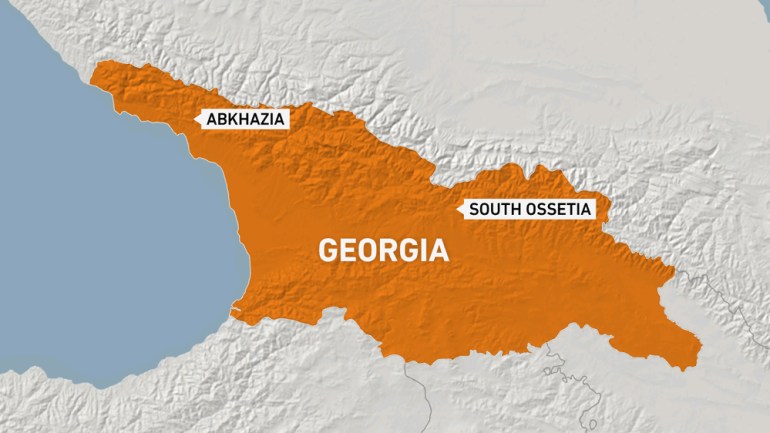South Ossetia again mulls referendum on joining Russia, but even Moscow doesn’t seem keen
April 1, 2022
Marek Grzegorczyk
Russia appears to have little appetite for raising the stakes in South Ossetia, a breakaway region of Georgia it recognised as independent in 2008 and which this week said is mulling a referendum on becoming part of Russia.
Moscow has been quick to play down the idea that the Georgian region of South Ossetia might soon vote to become part of the Russian Federation.
While not dismissing the notion out of hand, Kremlin spokesperson Dmitry Peskov told reporters on March 31 that he would not voice an opinion on South Ossetia’s plans to hold a referendum on the matter.
“No legal or any other action has been taken in this respect,” Peskov said. “But at the same time we treat the expression of the opinion of the people of South Ossetia with respect.”
Anatoly Bibilov, the de facto president of South Ossetia, usually referred to in Georgia as the Tskhinvali region, suggested this week that the separatist republic could hold a referendum on joining Russia after a presidential election in the region – which Bibilov is expected to win by a wide margin – on April 10.
“I believe that joining with Russia is our strategic goal, our path, our people’s wish,” said Bibilov. “We will take the relevant legislative steps shortly. The republic of South Ossetia will be part of its historical homeland – Russia.”
Bibilov’s spokesperson Dina Gassiyeva additionally told Russia’s RIA Novosti news agency that the region planned to hold a referendum and the decision was “linked with the window of opportunity that opened in the current situation” – a clear reference to Russia’s invasion of Ukraine.
South Ossetian forces have taken an active part in the invasion, with around 2,000 Russian and local troops based in the territory having been redeployed to Ukraine.
Georgia’s other Russian-backed region, Abkhazia in the northwest of the country, from where Russian troops have also been redeployed to Ukraine, was quick to rule out a similar move. It said that while it supported South Ossetia’s aspirations to become part of Russia, it did not share the same goal.
“Russia is our strategic partner, a dear and close state, but we in [Abkhazia] have no intention of joining the Russian Federation,” Valery Kvarchia, speaker of the region’s breakaway parliament.
Recognised only by Russia
South Ossetia, which has a population of around 50,000, engaged in an armed struggle for secession from 1989 to 1992. As in Abkhazia, the separatists were backed by Russia both politically and militarily.
The conflict remained largely frozen, with South Ossetia de facto independent from Tbilisi, until 2004, when Georgia’s then-president Mikheil Saakashvili vowed to reincorporate all of the country’s separatist territories.
In the coastal region of Adjara, which since the early 1990s had been the personal fiefdom of the staunchly pro-Russian Aslan Abashidze, this was achieved peacefully: Abashidze fled into exile (in Moscow) and Adjara now enjoys a great deal of autonomy and is one of the Georgia’s most prosperous regions.
Later in 2004 fighting broke out between Georgian forces and Ossetian separatists around the town of Tskhinvali, but Saakashvili did not force the issue again until 2008, when increased Russian military activity in the region led to new skirmishes.
In August 2008, Saakashvili ordered a full-scale military offensive which initially took control of significant parts of South Ossetia. Russian then declared war on Georgia, claiming some of its “peacekeepers” in the region had been killed. A brief, full-scale war ensued, in which hundreds were killed and Georgia was heavily defeated: its forces withdrew from South Ossetia (including from areas they had held prior to 2008), and for a brief period Russia occupied the Georgian towns of Gori and Zugdidi.
After a ceasefire ended the war, many ethnic Georgians were forced to flee the region. The territory today remains under Russian occupation and almost entirely dependent on Moscow, which exerts a decisive influence over its politics and governance. While Russia has recognised the independence of both South Ossetia and Abkhazia, only a handful of states have joined it in doing so: most of the world considers both territories to be part of Georgia.
‘Unacceptable’
Tbilisi has called the idea of South Ossetia holding a referendum “unacceptable”.
Georgian Foreign Minister David Zalkaliani said that South Ossetia was an “occupied territory” that belongs to Georgia, and that, “any referendum will have no legal force. The European Court of Human Rights has ruled that the Georgian region is occupied by Russia.”
US State Department Spokesperson Ned Price meanwhile said that, “we will not recognise the results of any effort by Russia or its proxies to divide sovereign Georgian territory. We reaffirm our steadfast commitment to Georgia’s sovereignty and territorial integrity within its internationally recognised borders.”
On March 30, Ukraine’s president, Volodymr Zelensky, recalled Kyiv’s ambassador in Tbilisi, suggesting he had not done enough to convince Georgia to punish Russia for its invasion. Ukraine’s ambassador to Morrocco was recalled for similar reasons.
In response, however, Zalkaliani said that Georgia was in “full compliance” with the financial sanctions imposed by the international community against Russia.
“The National Bank of Georgia has already made it clear that Georgia is complying with its obligations and international standards,” he said.
Irakli Kobakhidze, the leader of the ruling Georgian Dream party, said that Ukraine’s recall of its ambassador was “an insult”.
Kobakhidze said that Georgia had offered Ukraine “unwavering” support.
Georgian President Salome Zurabishvili later told CNN that the country was participating in “all kinds” of international financial sanctions.
“At the same time, we are participating in all the international resolutions that have been taken to support Ukraine. We share [with Ukraine] a common two-century history of Russian aggression and we know what that means,” added Zurabishvili.
South Ossetia has previously mulled holding a referendum on its status several times in the past, most recently in 2016. The plan was quietly dropped after failing to receive backing in Moscow.
Georgia’s South Ossetia plans to take steps to join Russia
Its separatist leader says the Moscow-backed breakaway region plans to take steps to become part of Russia.

The separatist leader of Georgia’s breakaway region of South Ossetia says the Moscow-backed territory is planning to take steps in the near future to become part of Russia.
Russia recognised South Ossetia as an independent state in 2008 after fighting a short war with Georgia. It has provided the separatist region with extensive financial support, offered Russian citizenship to its population and stationed thousands of Russian troops there.
KEEP READING
list of 3 itemsSouth Ossetia holds polls amid slow recovery
South Ossetia referendum is not legal
Putin approves army deal with Georgia’s South Ossetia
“I believe that unification with Russia is our strategic goal, our path, the aspiration of the people,” Anatoly Bibilov, the separatist leader of South Ossetia, was quoted as saying by the press service of the United Russia party.
“We will take the relevant legislative steps shortly. The republic of South Ossetia will be part of its historical homeland – Russia.”
Bibilov’s spokeswoman Dina Gassiyeva on Thursday told Russia’s RIA Novosti news agency that the region planned to hold a referendum and the decision was “linked with the window of opportunity that opened in the current situation”, referring to Russia’s invasion of Ukraine.
Georgia’s reaction
Georgian Foreign Minister David Zalkaliani said on Thursday “it is unacceptable to speak of any referendums while the territory is occupied by Russia”.
“Such a referendum will have no legal force,” he told journalists. “The European Court of Human Rights has ruled that the Georgian region is occupied by Russia.”
Also on Thursday, Kremlin spokesman Dmitry Peskov said Moscow has not taken any “legal” steps on the matter.
“But at the same time, we are talking about people of South Osseita expressing their opinion and we treat it with respect,” Peskov told reporters.
Meanwhile, Abkhazia, another Russian-backed breakaway region of Georgia, said on Wednesday it had no plans to join Russia.
“Russia is our strategic partner, a dear and close state, but we in the republic [of Abkhazia] have no intention of joining the Russian Federation,” parliamentary speaker Valery Kvarchia told Interfax news agency.
Another official from Abkhazia, Security Council Secretary Sergei Shamba, told the TASS news agency that the region supported South Ossetia’s aspirations but that it did not share its goal to join Russia.

‘We support Russia’
Separately, on Wednesday, South Ossetia’s former separatist leader Eduard Kokoity said that “hundreds of fighters” had joined Russia’s war in Ukraine, adding that they were treated as “cannon fodder”.
“I don’t doubt that the boys who already returned home could go back to the special operation zone and help complete the liberation of Donbas IF THEY FIND IT NECESSARY,” Kokoity wrote on Telegram on Wednesday according to reports by news outlet Ekho Kavkaza.
“But I’d like to emphasise that the organisation of their participation should be maximally responsible. We have to protect each life,” he wrote.
A day before he criticised Moscow for the deployment of South Ossetians in the region of Donbas, saying his people were not “cannon fodder”.
However, he was also clear on his support for Russia.
“We understand that if Russia loses, all of us will lose,” he was quoted by the Ekho Kavkaza website as saying. “No man in Ossetia says no. On the contrary, we say: ‘Yes, we support Putin, we support Russia.'”
South Ossetia and Abkhazia broke away from Georgia with Russian backing in the early 1990s as the Soviet Union collapsed. Moscow gained complete control over the two regions in 2008.
As in the Russian-speaking Donbas region of eastern Ukraine, Moscow has used recognition of the breakaway regions, and the awarding of citizenships, to maintain an armed presence in an area of the former Soviet Union that it sees as part of its natural sphere of influence.
No comments:
Post a Comment